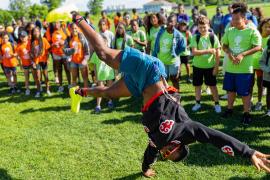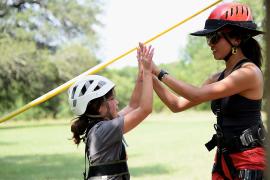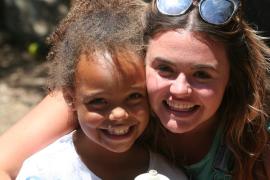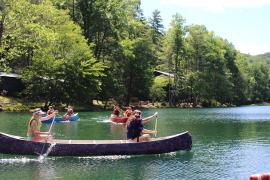Somewhere far, far away at a hypothetical camp very much different than yours, a radio crackles to life.
“Has anybody seen Jason? Archery was supposed to start 15 minutes ago and there’s nobody here at the range.”
*sigh*
Oh Jason . . . that’s the second time this week. What’s going on with him anyway? He was so solid last summer — always on time and endlessly positive — which is why it was so easy to hire him back for this summer and trust him with more responsibilities. He was off to such a good start but in the last week or so, his jokes at line call have become decidedly cynical.
“Hang tight,” the director who isn’t you replies. “We’ll find somebody and send them your way…”
Maybe Jason is lazier than previously known. Maybe he’s caught up trying to get the attention of the cute girl on the equestrian staff — horses do seem to be more popular with the male staff this year. Maybe he’s depressed…that article a few weeks ago did a great job explaining the pandemic’s devastating impact on mental health, especially among collegiates . . .
…Or maybe Jason is burning out.
Understatement Alert: working at camp takes energy . . . a lot of energy. Inviting multitudes of children to partake in a plethora of semi-to-outright dangerous activities takes an enormous amount of planning and effort to pull off, a fact that should surprise exactly no one. And, if we’re honest, a certain amount of burnout along the way is inevitable — many of your staff will discover the limits of their energy, and/or the consequences of mismanaging it, for the first time while working at camp. But that doesn’t mean there isn’t anything you could, or should, be doing to prevent or slow down staff burnout in such a high-burn environment.
Responding to staff burnout begins by knowing what to look for. The World Health Organization made waves in 2019 when it included a definition for burnout in the latest edition of its International Classification of Disease (IDC-11). Listing burnout as an “occupational phenomenon” (rather than medical condition) that is “conceptualized as a result of chronic workplace stress that has not been successfully managed,” IDC-11 lists three main characteristics of burnout:
- Feelings of energy depletion or exhaustion.
- Increased mental distance from one’s job, or feelings of negativism or cynicism to one’s job.
- Reduced professional efficacy.
Put simply, burnout is the result of systems that use up energy without properly accounting for where that energy comes from, how fast it’s being consumed, and how it will be replenished. It’s tempting to pin the “that has not been properly managed” part on the individual and ignore the “chronic workplace stress” bit. We never blame a canary for emerging from a coal mine sick and silent.
Let’s pause here to note that because burnout is a result of high energy output without an adequate way of replacing that energy, it is more likely to occur in your leadership staff or star performers — aka. the people you are most reliant on. It can be easy to think your top tier staff’s acquired experience, expansive program knowledge, and established relationships will combine to create a barrier against burnout. And while it’s true that those factors, in the correct context, can slow down burnout, they are also factors that might serve to accelerate it.
The staff member that everybody knows is likely the staff member that everybody goes to with their questions, stresses, and camp drama. The team member that knows the most about your program is likely the team member that ends up carrying the heaviest share of the load, and the team member with the longest tenure might also be the team member with the most anecdotes of poorly addressed moments of crisis or high stress.
“Camp only runs for a few weeks,” you might be thinking. “They’ll be fine.” And in the largest version of the picture, you’d be right. The camp season is relatively short and, compared to the risk of most activities you offer, burnout is highly unlikely to be thing to injure or kill a staff member. But just because the stakes aren’t direct bodily harm or death doesn’t mean there aren’t real consequences of staff burning out.
A burnt-out admin staff misses important details, generating complications for others (including you) that take valuable time and energy to correct. A burnt-out counselor is less likely to provide ample supervision, becoming less sensitive to negative interactions between campers and, at worst, teaching them negative behaviors. A burnt-out activity instructor is more likely to let their safety standards slip or start classes late, leaving campers bored and waiting around. A burnt-out general staff is likely to spread misinformation and cynicism wherever he/she/they goes throughout the day and, after the camp season is over, any burnt-out staff are much less likely to return for another season, increasing turn-over and adding to the already heavy burden of yearly hiring.
Bummed out? Don’t be. There are a few simple tools you can use to be proactive in stemming the tide of burnout during the camp season.
1. Talk about It
Acknowledging the real possibility of burning out during the camp season could mean the difference between staff informing you when they are close to burning out verses them attempting to hide it from you. Adding a module about burnout to your training program that teaches staff the definition and drivers of burnout can help them become more aware of their energy levels throughout the camp season. Setting up pathways for them to be proactive when they sense they are in trouble. Providing your staff with a list of local activity suggestions or destinations encourages them to spend time off away from camp — an effective way to feel some separation from the daily stress. Sharing your own experience with burnout can help them feel more comfortable voicing their experience rather than feeling the need to minimize or isolate.
2. Structure for It
The camp experience is often an awkward marriage of precision-planning and improvised problem-solving. Just because the schedule shows campers arriving to the pool at 1 PM doesn’t mean little Timmy won’t randomly puke his lunch in front of his cabinmates somewhere along the way. Indeed, every day at camp holds an untold number of surprises, but scheduling practices that prevent burnout are still possible.
Start by visualizing the major elements of each day - meals, activities, campfires, rest periods, etc. - and then look for opportunities to either combine the efforts of your staff or give them a small break somewhere throughout the day. Even short breaks throughout the day can be the difference between staff crawling away from the camp season or striding across the finish line with energy to spare. Likewise, if Jason is the third archery instructor to burn out in the middle of the camp season, the culprit is the role, not Jason. Set aside time in the off season to evaluate the overall structure of your program, looking at each role through the lens of energy burn.
Be on the lookout for “hidden burns” — pieces of your program seem insignificant on paper but take time/energy in practice (i.e., being responsible for rain-day activities), staff positions that are “catch all” spaces (aka the Main Office) or spotting staff who are in danger of overloading themselves by constantly volunteering for small responsibilities. Burnout is often found hiding under a mountain of tiny to-dos. Continually refining your structure and training practices will go a long way in preventing or slowing down burnout. Lastly, consider hiring an additional position or two as flex staff, giving you the room to spread responsibilities out in real time as you either prevent or respond to burnout.
3. Measure for It
If you aren’t directly asking your staff to assess their energy, now is the time to start. A brief weekly self-assessment form could do the trick. So could mid-summer performance reviews. Finding the right measurement tool can be tricky — assigning regular staff check-ins to your admin team runs the risk of burning them out and few things are as demotivating as filling out a form you are increasingly sure nobody will read or respond to. Still, directly asking staff to assess and report their energy is a vital component of being proactive in the fight against burnout. If you end each day with a team debrief, try splitting into small groups and including an energy question. If you aren’t sure what to ask, “Are you feeling burned out?” usually turns out to be surprisingly effective.
4. Respond to It
Whether it’s Jason not showing up to run archery (again) or it’s Tiffany indicating that she’s exhausted on the weekly check-in form - once you’ve spotted burnout it’s time to jump into action…immediately. Reach out with an invitation to share the next meal together to talk through what he/she/they are experiencing and explore possible adjustments. It’s very possible that simply making time to reflect, process, and encourage can help dissipate pent-up stress that’s turning into burnout.
You also might discover circumstances you weren’t aware of — Tiffany has been staying up late to ensure camper medications are in ready for breakfast while Jason points out he has a speaking part in almost every skit this year — and an effective pivot won’t be too hard to make (get Tiffany some help and reassign some skits to other, less involved staff). For more extreme cases, make extra time to listen and then look for (or create) time gaps in the next 24-48 hours as opportunities for the individual to step away and recover. Having some suggested locations or practices on hand to offer can help a team member struggling with burnout feel more confident that they can recover and finish strong.
On some level, burnout is unavoidable during the camp season. Some of your staff are underdeveloped and appropriate levels of responsibility will stretch them. Others just aren’t the fit you’d hoped they would be, while a few end up being exactly who you feared they would be when you took a leap of faith and clicked ‘accept’ on their application. But often some of best, brightest, and happiest staff — the ones you lean on the most — will begin to burn out.
You can’t prevent burnout entirely, and you aren’t responsible for managing everyone else’s time, energy, and commitment. But you can always get better at facilitating valuable conversations and trainings that position your staff for success by helping them spot the early signs of burnout so you can respond before the flames are too hot to extinguish.
This blog was written on behalf of Project Real Job, whose purpose is to support camps in their efforts to recruit, hire, and retain staff.
Donnie Keele III, Media & Learning Specialist at UltraCamp, is a communicator and certified coach who specializes in helping others discover and share what makes them unique and gives them purpose. Equipped with degrees in mass communication and campus chaplaincy as well as 15+ years of experience split between summer camp administration and university student affairs & development, he now produces digital media and learning engagements for UltraCamp in Niles, MI. His current focus is helping camp professionals make sense of complex and shifting demands so they can continue growing as exceptional leaders who provide transformational experiences for campers and staff alike. Connect with Donnie by email at [email protected].
Originally published at ultracampmanagement.com/blogs/spotting-staff-burnout%EF%BF%BC/
The views and opinions expressed by contributors are their own and do not necessarily reflect the views of the American Camp Association or ACA employees.




